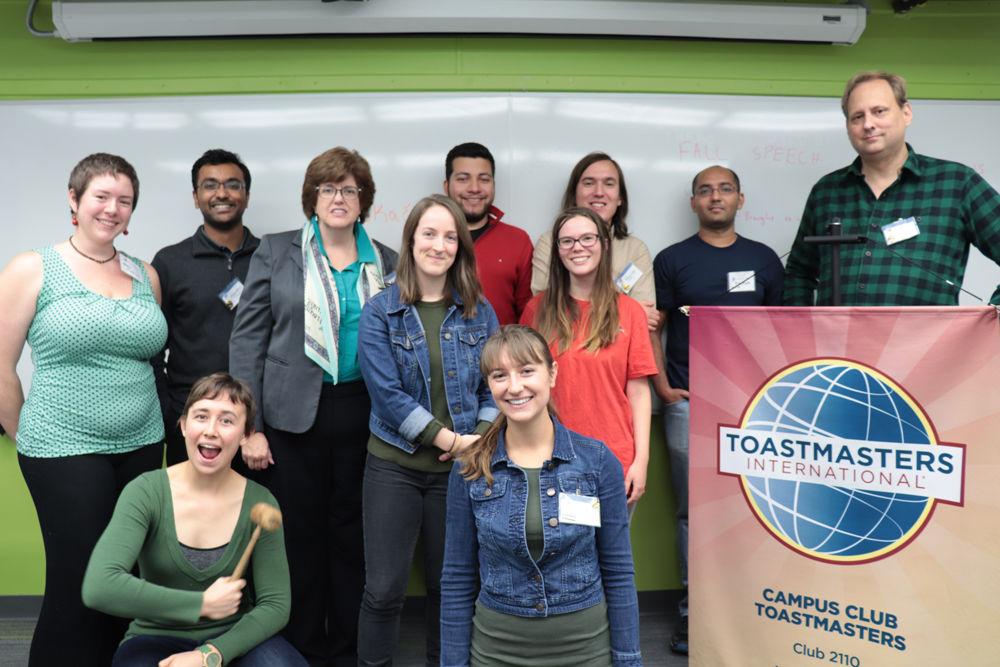Communication is central to everything humans do. As a species, our ability to communicate has always been inextricably linked to our survival. In life, it doesn’t matter what path you take – you will be in constant communication with your coworkers, friends, family and even total strangers every day.
This can be a daunting prospect for those of us who have a hard time speaking in front of people. And even for those who don’t, there’s always room for improvement. Thankfully, Campus Toastmasters is here to help.
Toastmasters International was founded in the 1920s with the aim of helping young men improve their public speaking skills. Since then, it has grown to include over 16,000 individual Toastmasters clubs in 143 countries. North Carolina alone houses around 200 of these clubs.
Rob Streight, the vice president public relations of Campus Toastmasters at NC State, said that many people join Toastmasters for professional reasons, but don’t realize the club is much more than that.
“A lot of people come here and think, okay, Toastmasters can help me with my career,” Streight said. “That’s what gets them to join. But then they start meeting people in the club and knowing their stories, friendships develop and before you know it, they’re not coming for the career part anymore, they’re coming because they just want to have a good time.”
Each week at club meetings, several of the attending members are assigned roles: toastmaster, grammarian, evaluator, timer, table topics master or general evaluator. Each role plays a unique part in moderating the meeting. For example, the toastmaster introduces each member and their roles and acts as master of ceremonies for the meeting. Then, any member who has prepared a speech for the meeting will speak.
At the Oct. 17 meeting, Vasudev Haribal, a Ph.D. student studying chemical and biomolecular engineering and the vice president education of Campus Toastmasters, performed Kent Nerburn’s “The Cab Ride I’ll Never Forget,” a dramatic speech about a young cabbie who picks up an old woman on her way to hospice.
“As I’m doing a Ph.D., I got tired of slide presentations using technical data,” Haribal said. “It’s been 7-8 years I’ve been doing those kind of presentations. I wanted to do something without slides, different kinds of speeches. You talk humorous, you tell stories, you do inspirational talks, motivational talks, different kinds of skills which don’t have any [visual assistance]. I wanted to develop those kinds of skills, so I joined Toastmasters.”
Julie Long, the president of Campus Toastmasters, was the evaluator at that meeting, and had only good things to say about Haribal’s speech.
“When we do evaluations, we’re supposed to keep certain things in mind about how you deliver the speech, whether it’s suited to the audience and whether you’re well prepared,” Long said. “… I was supposed to say something that Vasudev could improve. So, evaluations are structured to help people improve with their speaking and encourage them.”
Evaluations also prepare members for competitions. Every year, Toastmasters members have the opportunity to rise through the ranks as area, division, district and finally international competitors. Long is currently ranked second in the area in the humorous speech category.
Toastmasters clubs are often strictly regulated. Streight said that he visited dozens of Toastmasters clubs in the Raleigh area before settling on Campus Toastmasters, and noticed a businesslike formal structure which could seem intimidating to some.
“I visited all of the open clubs within 25 miles of Raleigh, which is about 50 clubs,” Streight said, “and compared to those clubs, this club is informal in that other clubs would have a printed agenda that you would get before the meeting starts with all the speakers and all the evaluators and all the roles filled… If you do a benchmark and go to another Toastmasters club, you’ll probably see a little more rigidity.”
Streight was the general evaluator at their meeting on Oct. 17, while Theresa Piskackova, a Ph.D. student in crop and soil sciences and the vice president membership of Campus Toastmasters, was the timer. She said she tried several different Toastmasters clubs while finishing her master’s degree in North Dakota, and was surprised by the laid-back atmosphere of Campus Toastmasters at NC State.
“I do have to say that the culture at this club is unlike most Toastmaster’s clubs that I’ve been to,” Piskackova said. “It’s more casual, it’s more relaxed, it’s a little more free-flowing from week to week. I think that the culture of it is looser.”
Haribal and Piskackova agreed that the leadership opportunities offered each week also benefit members’ learning experiences, and are just fun.
“Toastmasters is really cool where you get to be a leader for one day,” Piskackova said. “… You can’t walk into any other club like that and just decide to be the master of ceremonies for a day, decide to be the treasurer for a day, you don’t do that. So I like that you get to have different roles every time, and it can be always different.”
Whether you’re looking for an opportunity to lead, need to practice your public speaking skills in a nonjudgmental environment or just want to expand your social circle, Toastmasters has a little something to offer everyone. Prospective members need not be students to apply.
Guests are always welcome at their meetings every other Wednesday at 5:45 p.m. in 103 Kilgore Hall, with their next meeting being held on Oct. 31. Students living on Centennial campus might also consider joining Centennial Visioneers, NC State’s other Toastmasters club, which meets Wednesdays at noon at the CIPM conference room at 1730 Varsity Drive, Venture IV, Suite 110.













